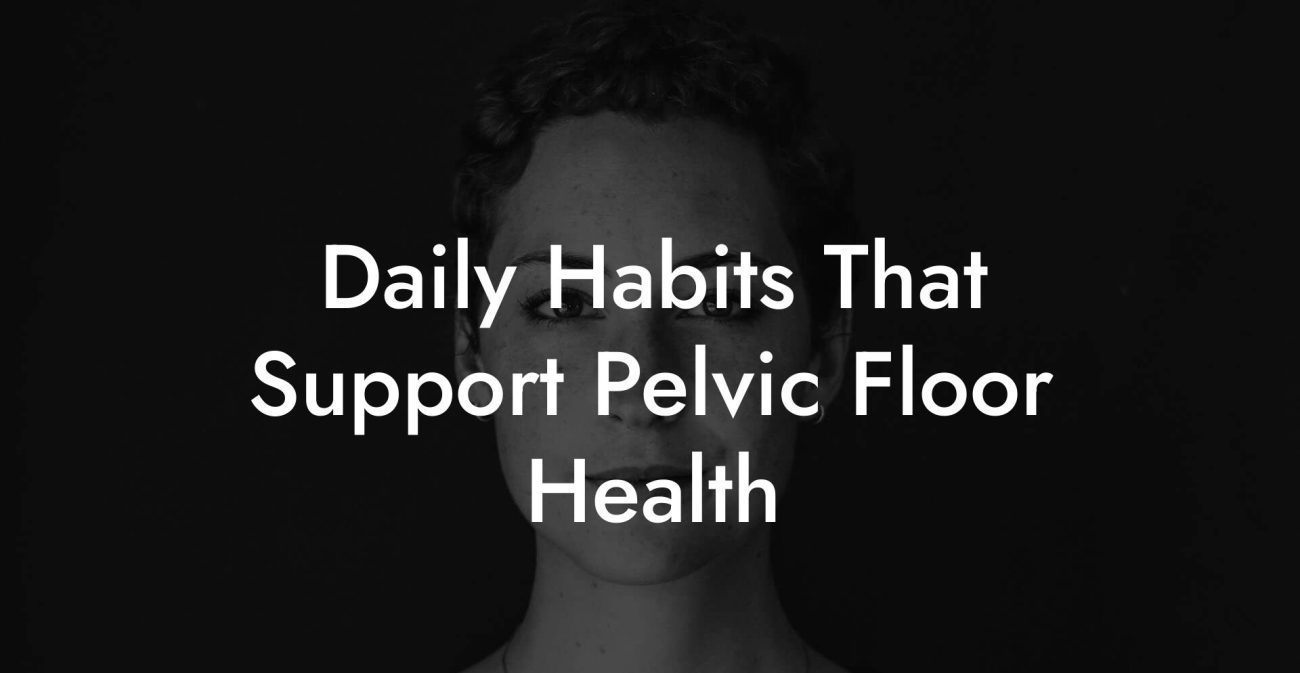
Pelvic Floor Therapy
Stress Less, Strengthen More: How Managing Stress Can Improve Your Pelvic Floor

Ever feel like your body is a ticking time bomb, stress levels skyrocketing while your pelvic floor silently bears the brunt? It might sound wild, but managing your stress is actually a secret weapon for strengthening your pelvic floor. In today’s fast-paced world, where hustle culture reigns and anxiety lurks behind every notification, it’s time to give your pelvic health the TLC it deserves. Get ready to explore how embracing stress management techniques can transform your pelvic floor health, while keeping things relatable, humorous, and refreshingly real.
Quick Links to Useful Sections
- The Stress-Pelvic Floor Connection: Uncovering the Link Between Mental Pressure and Pelvic Health
- How Does Stress Impact Your Pelvic Floor?
- Physiological Response to Stress
- The Vicious Cycle: Stress, Muscle Tension, and Pelvic Dysfunction
- The Science Behind Stress and Pelvic Floor Dysfunction
- Mastering Stress: Practical Tips to Strengthen Your Pelvic Floor
- Mindfulness and Meditation
- Deep Breathing and Progressive Muscle Relaxation
- The Role of Physical Activity and Pelvic Floor Exercises
- Nutrition and Lifestyle: Fueling Resilience
- Anti-Inflammatory Foods and Supplements
- Sleep, Hydration, and Recovery
- Integrative Strategies: Combining Conventional and Holistic Therapies
- Building Your Personalized Stress Management & Pelvic Floor Empowerment Plan
- Step 1: Comprehensive Self-Assessment
- Step 2: Set Clear, Actionable Goals
- Step 3: Mix and Match Strategies
- Step 4: Create a Daily Routine
- Step 5: Monitor Your Progress and Adjust
- Resources and Community Support: Your Next Steps
- Frequently Asked Questions About Managing Stress and Pelvic Floor Health
- Start Your Journey to a Stronger, Healthier Pelvic Floor Today
The Stress-Pelvic Floor Connection: Uncovering the Link Between Mental Pressure and Pelvic Health
It turns out that stress isn’t just a mental strain, it can wreak havoc on your body in unexpected ways. Think about it: when you're stressed, your muscles tense up, your breathing becomes shallow, and even your digestion can go haywire. But did you know that all this tension can extend to your pelvic floor? This intricate network of muscles supports everything from bladder control to sexual health, and chronic stress can compromise its integrity over time.
The pelvic floor isn’t an isolated part of your anatomy; it’s intimately connected to your overall well-being. When stress spikes, your sympathetic nervous system goes into overdrive, releasing cortisol and adrenaline. These stress hormones can prompt your pelvic floor muscles to tighten up as part of the body’s “fight-or-flight” response. And while that might have been helpful in a caveman-era tussle, in our modern world, this constant tightness can lead to painful, dysfunctional, and ultimately weakened pelvic muscles.
For Gen-Z and millennial warriors juggling virtual deadlines, real-world responsibilities, and the occasional existential crisis, understanding the impact of stress on your pelvic floor is the first step in reclaiming control over your health. Keywords like “pelvic floor exercises,” “pelvic floor health,” and “stress management for pelvic floor dysfunction” are hot on the SEO map and crucial to unlocking empowered well-being.
How Does Stress Impact Your Pelvic Floor?
To get to the heart of the matter, let’s break down exactly how stress can influence pelvic floor function. We’re diving into the interplay between brain, body, and bladder, because yes, your stress can mess with your pee too!
Your pelvic floor affects how you move, how you use the bathroom, and how sex feels, yet most men are never taught how it works. This essential guide explains your pelvic floor in plain language and gives you a simple plan to relax, strengthen, and look after it at home.
Youll Learn How To:
- Understand what your pelvic floor does for bladder control, posture, and sex
- Spot signs of tension, weakness, and poor coordination
- Use breathing, reverse Kegels, and classic Kegels safely
- Improve habits for sitting, lifting, sport, sleep, and stress
Whats Inside: friendly explanations, safety guidelines, daily drills, sex function tools, flare up plans, and a complete twelve week program with trackers.
Perfect For: men of all ages who want less pelvic tension, fewer leaks, better comfort on the toilet, and more confidence in movement and in the bedroom.
Physiological Response to Stress
When stress strikes, your body's natural response is to release hormones that prepare you to either fight or flee. This adrenaline rush is great for escaping a charging rhino, but not so much for everyday tasks. The sheer rush of cortisol and adrenaline causes muscles across your body, including those in your pelvic region, to contract and tighten. This physical response is designed for short spurts, not chronic activation.
Over time, consistently high stress levels can lead to a state of hypervigilance where your pelvic muscles remain in a state of constant contraction. Imagine trying to relax in a never-ending muscle squeeze, yep, not fun, and definitely not protective for your pelvic floor in the long run.
The Vicious Cycle: Stress, Muscle Tension, and Pelvic Dysfunction
The plot thickens when you realize that a stressed pelvic floor is more prone to dysfunction. That constant tension can lead to a host of issues such as pelvic pain, urinary incontinence, and even sexual dysfunction. It becomes a vicious cycle: stress leads to muscle tension, which in turn leads to pelvic discomfort, fueling even more stress. Breaking this cycle is key to restoring both your mental and physical balance.
Integrating keywords such as “managing stress and pelvic floor dysfunction” and “pelvic floor therapy for stress relief” into your daily vocabulary is not only great for your SEO strategy, but it also helps you remember that you’re a holistic being, capable of turning this cycle on its head.
The Science Behind Stress and Pelvic Floor Dysfunction
Let’s geek out a little: the relationship between stress and pelvic floor health isn’t just an opinion, it’s backed by science. Studies have shown that chronic stress can alter the way nerves and muscles communicate, leading to an overactive pelvic floor. This means that your muscles could be reacting to stress in ways that contribute to pain and dysfunction.
Research in neurophysiology demonstrates that stress-related hormones can alter the functioning of smooth muscle tissues. Given that the pelvic floor comprises both smooth and striated muscles, it’s especially vulnerable. Prolonged periods of stress not only lead to chronic muscle tension but also impair blood flow to these tissues, making it more difficult for them to repair and regenerate.
And while it may sound like something straight out of a medical textbook, the bottom line is simple: managing stress is critical for maintaining a healthy, functional pelvic floor. Phrases like “stress-induced pelvic dysfunction” and “neuro-muscular aspects of pelvic health” are more than just buzzwords, they’re the intersection of your mental state and physical function.
Mastering Stress: Practical Tips to Strengthen Your Pelvic Floor
Now that we’ve established that stress can sabotage your pelvic floor, let’s talk solution mode. Whether you’re a yoga enthusiast, a meditation newbie, or just trying to keep it together during a hectic workday, here are some fail-proof strategies to harness stress and turn it into a force for good.
Mindfulness and Meditation
The power of mindfulness cannot be overstated. Meditation practices help retrain your brain to acknowledge stress without giving it the power to control your body. Even if you think “meditation” is a buzzword reserved for Instagram influencers, studies suggest that a few minutes of focused mindfulness each day can help reduce cortisol levels and relax your pelvic muscles.
Start with just 5 minutes a day. Find a quiet space, close your eyes, and observe your breathing. Soon, you’ll notice that the constant hum of anxiety begins to quiet down. That extra zen factor? It might just be the key to a more resilient pelvic floor.
Your pelvic floor affects how you move, how you use the bathroom, and how sex feels, yet most men are never taught how it works. This essential guide explains your pelvic floor in plain language and gives you a simple plan to relax, strengthen, and look after it at home.
Youll Learn How To:
- Understand what your pelvic floor does for bladder control, posture, and sex
- Spot signs of tension, weakness, and poor coordination
- Use breathing, reverse Kegels, and classic Kegels safely
- Improve habits for sitting, lifting, sport, sleep, and stress
Whats Inside: friendly explanations, safety guidelines, daily drills, sex function tools, flare up plans, and a complete twelve week program with trackers.
Perfect For: men of all ages who want less pelvic tension, fewer leaks, better comfort on the toilet, and more confidence in movement and in the bedroom.
Deep Breathing and Progressive Muscle Relaxation
Ever heard of diaphragmatic breathing? It’s a technique that encourages you to breathe from your belly rather than your chest, promoting full oxygen exchange and triggering your body’s relaxation response. This form of deep breathing not only reduces stress but also synchronizes beautifully with pelvic floor activation.
Progressive muscle relaxation (PMR) is another game-changer. PMR involves tensing and then slowly releasing each muscle group. By consciously engaging in these exercises, you can release the pent-up tension in your pelvic floor, allowing the muscles to relax and function more efficiently.
The Role of Physical Activity and Pelvic Floor Exercises
Of course, we can’t ignore the direct benefits of physical activity. Regular pelvic floor exercises, including Kegels and their reverse counterparts, are essential. But why stop there? Incorporate exercises that combine core strength and stress relief, think Pilates, yoga, or even a brisk walk outside. These activities not only build muscular strength but also help lower stress levels.
Mixing traditional pelvic floor exercises with holistic practices like yoga creates a synergy that can enhance both your mental clarity and physical stability. Keywords such as “pelvic floor strengthening,” “yoga for pelvic health,” and “stress reduction exercises” serve as handy guides in your journey to a healthier, happier body.
Nutrition and Lifestyle: Fueling Resilience
Now, let’s shift gears to another critical element, nutrition and lifestyle. Your diet plays a pivotal role in shaping your body’s response to stress. The nutrients you consume can soothe inflammation, promote muscle repair, and energize your overall system.
Anti-Inflammatory Foods and Supplements
Think of your body as a high-performance machine that requires premium fuel. An anti-inflammatory diet, full of colorful fruits, leafy greens, whole grains, and healthy fats, can dramatically reduce chronic inflammation. Omega-3 fatty acids found in fatty fish, walnuts, and flaxseeds, as well as antioxidants from berries and leafy vegetables, help maintain muscle elasticity and protect your pelvic floor.
And if you’re feeling adventurous, consider integrating supplements that boost your body's natural healing powers, always with a consultation from your healthcare provider. Supplements like turmeric, magnesium, and Vitamin D can be particularly beneficial for muscle repair and inflammation reduction.
Sleep, Hydration, and Recovery
Ever notice how everything seems easier after a good night’s sleep? Quality sleep is your body's natural reset button. During deep sleep, your body repairs tissues, balances hormones, and reduces overall stress. Aim for 7-9 hours a night to give your pelvic muscles the recovery time they need.
Hydration is equally important. Drinking adequate water throughout the day helps maintain muscle elasticity and aids in digestion. Combine that with a balanced diet, and you’ve got a recipe for a pelvic floor that is as resilient as it is robust.
Lifestyle factors such as maintaining a healthy weight, managing caffeine intake, and being mindful of your posture also contribute significantly to pelvic health. This holistic approach transforms your daily habits into a strong, supportive framework for managing stress and enhancing your pelvic floor’s performance.
Your pelvic floor affects how you move, how you use the bathroom, and how sex feels, yet most men are never taught how it works. This essential guide explains your pelvic floor in plain language and gives you a simple plan to relax, strengthen, and look after it at home.
Youll Learn How To:
- Understand what your pelvic floor does for bladder control, posture, and sex
- Spot signs of tension, weakness, and poor coordination
- Use breathing, reverse Kegels, and classic Kegels safely
- Improve habits for sitting, lifting, sport, sleep, and stress
Whats Inside: friendly explanations, safety guidelines, daily drills, sex function tools, flare up plans, and a complete twelve week program with trackers.
Perfect For: men of all ages who want less pelvic tension, fewer leaks, better comfort on the toilet, and more confidence in movement and in the bedroom.
Integrative Strategies: Combining Conventional and Holistic Therapies
Picture this: you’re blending conventional pelvic floor physical therapy methods with alternative, holistic strategies to create a powerhouse of healing. It’s like mixing a killer workout with a nutritious smoothie, each element amplifies the benefits of the other.
Many experts now advocate for an integrative approach to pelvic floor therapy. This means combining targeted pelvic floor exercises with complementary treatments such as acupuncture, massage therapy, and chiropractic care. These therapies work in tandem to relieve chronic tension, improve circulation, and heighten your body’s natural awareness.
Additionally, incorporating advanced tools like biofeedback devices provides real-time data on your muscle activity. With this feedback, you can adjust your exercises to ensure you’re engaging the right muscles effectively. This integrative approach is especially powerful for those who have experienced pelvic pain, urinary incontinence, or even post-surgical recovery challenges.
Keywords like “integrative pelvic floor therapy” and “holistic pelvic health” aren’t just technical terms, they represent a movement toward comprehensive, sustainable health solutions that empower you to reclaim control over your bodily functions.
Building Your Personalized Stress Management & Pelvic Floor Empowerment Plan
No two bodies are the same, so why would your stress management and pelvic floor plan be any different? Crafting a personalized plan is the secret sauce to long-term success. The key is to integrate strategies that address both your stress levels and pelvic floor function.
Step 1: Comprehensive Self-Assessment
Start by taking a good, honest look at your current lifestyle. Identify your main sources of stress, note any pelvic floor symptoms (such as discomfort, pain, or incontinence), and list your daily habits. This initial assessment can help pinpoint areas that need immediate attention and form the basis of your customized plan.
Step 2: Set Clear, Actionable Goals
Whether your aim is to reduce pelvic tension, overcome chronic pelvic pain, or simply improve overall core strength, having clear and attainable goals is essential. Keywords to incorporate into your journey might include “pelvic floor exercises,” “stress management routines,” and “holistic wellness goals.” Write down these goals and track your progress over weeks and months.
Step 3: Mix and Match Strategies
Combine conventional pelvic floor exercises with stress reduction techniques like mindfulness meditation, deep breathing, and progressive muscle relaxation. Add in integrative therapies such as yoga, Pilates, or even acupuncture sessions, and balance them with nutritional tweaks designed to reduce inflammation. This balanced cocktail of methods ensures every facet of your physical and mental health receives attention.
Step 4: Create a Daily Routine
Routine is your friend. Craft a daily schedule that intertwines moments for relaxation and targeted pelvic floor work. Perhaps start your morning with a few gentle stretches and deep breathing exercises. Midday can be a perfect time for a light walk or a quick meditation session, and in the evening, incorporate some pelvic floor exercises or a short yoga routine. Over time, these habits will solidify into a ritual that not only strengthens your pelvic floor but also de-stresses your entire system.
Step 5: Monitor Your Progress and Adjust
Use a journal or a mobile app to track how you feel both physically and emotionally. Celebrate the small wins every time you notice less tension in your muscles or improved bladder control. Over time, as you adapt to your routine, tweak your plan according to your evolving needs and any feedback you receive from healthcare professionals. This dynamic approach ensures that your personalized plan grows with you.
Embracing a personalized strategy not only magnifies the benefits of managing stress but also empowers you to take charge of your pelvic floor health. It’s about blending the art of self-care with the science of muscle rehabilitation.
Resources and Community Support: Your Next Steps
Sometimes, the journey to better health feels like navigating a maze. The good news? You’re not alone. From online communities, expert-led webinars, to local pelvic floor physical therapy groups and wellness centers, there’s an entire ecosystem out there to support you.
Look for platforms that offer practical advice on stress management and pelvic floor exercises. Engage with podcasts, blogs, or social media pages that speak your language, funny yet factual, optimistic yet honest. These resources not only keep you motivated but also provide fresh insights into new techniques and trends that can enhance your personalized plan.
Remember, sometimes a quick chat with someone who’s been there can provide more clarity than hours of YouTube tutorials. Join forums, follow pelvic health influencers, or even attend workshops and webinars that focus on stress relief and holistic pelvic fitness. Integrating community support can be the catalyst for deeper learning and consistent practice.
The path to a stronger and more resilient pelvic floor isn’t just about individual effort, it’s a collaborative journey. Engage with your community, share your progress, ask questions, and celebrate milestones. With every interaction, you build a robust support network that reinforces your commitment to living stress less and thriving more.
Frequently Asked Questions About Managing Stress and Pelvic Floor Health
Below are some frequently asked questions to help further clarify the powerful link between stress management and pelvic floor health.
1. How does stress actually impact my pelvic floor?
When you're stressed, your body releases hormones like cortisol and adrenaline. These hormones cause your muscles, including those in your pelvic floor, to tense up. Over time, chronic stress can result in an overactive, tightened pelvic floor, leading to discomfort, pain, and even issues with incontinence.
2. Can stress management really improve pelvic floor function?
Absolutely. Techniques like mindfulness meditation, deep breathing exercises, and yoga help reduce overall muscle tension. By lowering stress levels, you foster an environment where your pelvic floor muscles can relax, heal, and strengthen.
3. What role does exercise play in managing stress and pelvic health?
Regular exercise, including targeted pelvic floor workouts and activities like Pilates or yoga, not only builds strength but also reduces stress. Physical activity increases blood flow, releases endorphins, and helps you maintain a healthier posture and muscle balance.
4. Are there nutritional changes I can make to support my pelvic floor?
Yes. An anti-inflammatory diet rich in fruits, vegetables, lean proteins, and healthy fats can reduce inflammation and improve overall muscle health. Staying hydrated and considering supplements like omega-3s or magnesium can also be beneficial.
5. Is it possible to integrate pelvic floor exercises into a busy schedule?
Definitely. Even short, dedicated sessions, like 5-10 minutes of Kegels or deep breathing exercises, can make a significant difference over time. The key is consistency and making your routine a natural part of your day.
6. Should I consult a professional before starting a new pelvic floor regimen?
It’s always a good idea to consult a pelvic health specialist or a physical therapist, especially if you’re experiencing chronic pain or incontinence. They can tailor a plan that meets your specific needs.
7. How does mindfulness benefit my pelvic floor specifically?
Mindfulness teaches you to recognize and consciously relax areas of tension. Over time, this practice helps break the cycle of stress and muscle guarding, allowing your pelvic floor to function optimally.
8. Can integrative therapies like acupuncture complement my pelvic floor exercises?
Yes, many people find that combining conventional pelvic floor exercises with complementary therapies like acupuncture or massage significantly enhances their pelvic health and reduces stress.
Start Your Journey to a Stronger, Healthier Pelvic Floor Today
There’s no magic pill or one-size-fits-all trick here, but by managing your stress, you’re laying a crucial foundation for optimal pelvic floor health. The benefits are undeniable: reduced tension, improved muscle control, and a greater sense of overall well-being. When you view stress management and pelvic floor exercises as two sides of the same coin, you unlock a holistic approach to wellness that, in today’s hectic world, is more essential than ever.
Embrace the tools at your disposal, from mindfulness and meditation to targeted pelvic floor exercises and anti-inflammatory nutrition, and watch as you transform your body, mind, and pelvic health. Remember, each deep breath, every mindful moment, and every cleverly executed exercise is a step toward a more resilient, empowered you.
So go ahead, stress less, strengthen more, and let your newfound pelvic strength serve as a foundation for living your best, most vibrant life. Your journey to empowered, holistic pelvic health starts now. Whether you're battling chronic pain, recovering from a setback, or simply striving for overall balance, every effort counts. Take that first step today and join a community of like-minded individuals committed to thriving in both body and mind.
Trust the process, have fun with the journey, and celebrate every success along the way. The power to transform your health is right in your hands, and your pelvic floor will thank you for it.
Your pelvic floor affects how you move, how you use the bathroom, and how sex feels, yet most men are never taught how it works. This essential guide explains your pelvic floor in plain language and gives you a simple plan to relax, strengthen, and look after it at home.
Youll Learn How To:
- Understand what your pelvic floor does for bladder control, posture, and sex
- Spot signs of tension, weakness, and poor coordination
- Use breathing, reverse Kegels, and classic Kegels safely
- Improve habits for sitting, lifting, sport, sleep, and stress
Whats Inside: friendly explanations, safety guidelines, daily drills, sex function tools, flare up plans, and a complete twelve week program with trackers.
Perfect For: men of all ages who want less pelvic tension, fewer leaks, better comfort on the toilet, and more confidence in movement and in the bedroom.
Curious About Your Pelvic Floor? Explore our curated collection of insightful articles to learn more and take charge of your health.
- Pelvic Floor Basics
- Pelvic Floor Exercises & Workouts
- Pelvic Floor Kegel Exercises: Techniques & Benefits
- Advanced Pelvic Floor Workouts
- Pre/Post-Natal Pelvic Floor Routines
- Pelvic Floor Exercises for Men
- Pelvic Floor Therapy Techniques
- At-home vs Professional Pelvic Floor Therapy Options
- Diet & Lifestyle for a Healthy Pelvic Floor
- Pelvic Floor Health & Wellness
- Specialized Pelvic Floor Conditions & Treatments
Now back to the main article!















